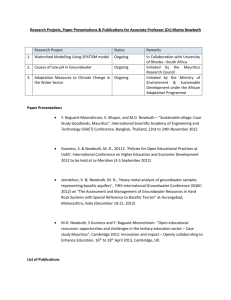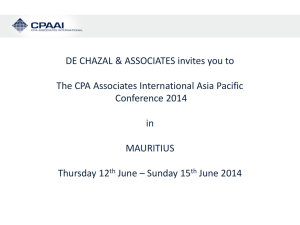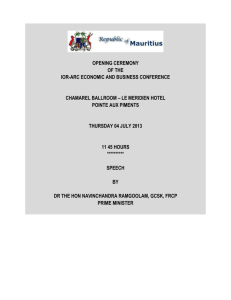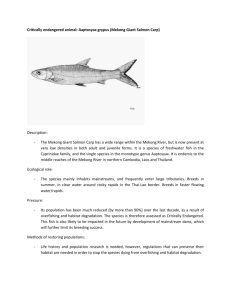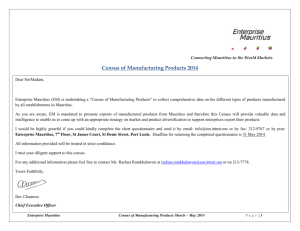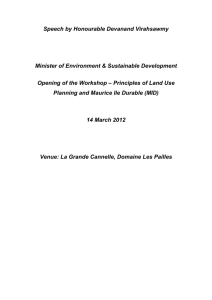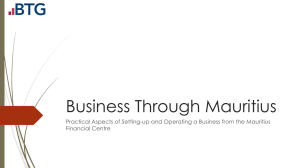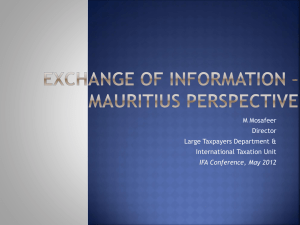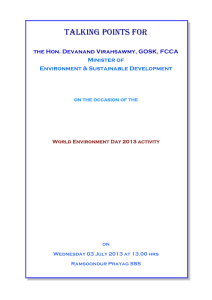Statement by Dr the Hon. Arvin Boolell, Minister of Foreign Affairs
advertisement
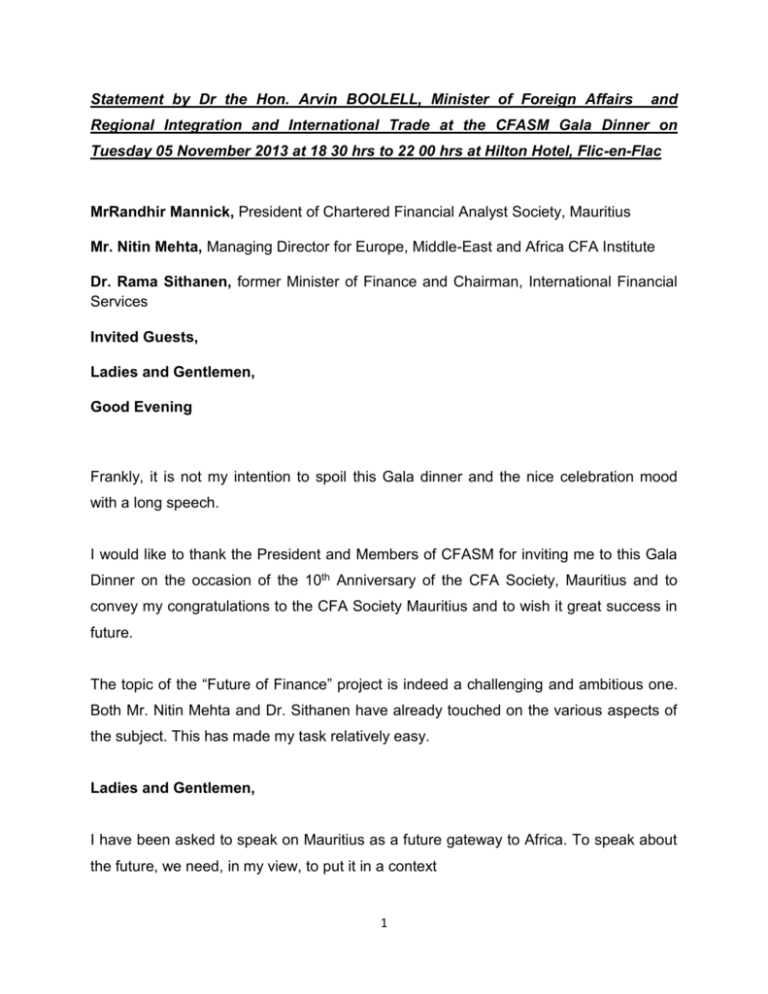
Statement by Dr the Hon. Arvin BOOLELL, Minister of Foreign Affairs and Regional Integration and International Trade at the CFASM Gala Dinner on Tuesday 05 November 2013 at 18 30 hrs to 22 00 hrs at Hilton Hotel, Flic-en-Flac MrRandhir Mannick, President of Chartered Financial Analyst Society, Mauritius Mr. Nitin Mehta, Managing Director for Europe, Middle-East and Africa CFA Institute Dr. Rama Sithanen, former Minister of Finance and Chairman, International Financial Services Invited Guests, Ladies and Gentlemen, Good Evening Frankly, it is not my intention to spoil this Gala dinner and the nice celebration mood with a long speech. I would like to thank the President and Members of CFASM for inviting me to this Gala Dinner on the occasion of the 10th Anniversary of the CFA Society, Mauritius and to convey my congratulations to the CFA Society Mauritius and to wish it great success in future. The topic of the “Future of Finance” project is indeed a challenging and ambitious one. Both Mr. Nitin Mehta and Dr. Sithanen have already touched on the various aspects of the subject. This has made my task relatively easy. Ladies and Gentlemen, I have been asked to speak on Mauritius as a future gateway to Africa. To speak about the future, we need, in my view, to put it in a context 1 The financial melt-down of 2008 broke the myth of an efficient financial and banking system that is self-regulating, self-correcting, built-in control and risk management. .Options derivatives, and leverage had become key to prosperity. Long-term investment in the productive sectors of the economy was exploited by the search of quick profits. It showed that there was a limit to the virtues of free market and laissez-faire, but there was no limit to greed. It also demonstrated that world governance did not keep pace with the onslaught of globalization driven by unbridled liberalization and re-regulation. The lesson is that there is a recognized need for a more active role of a strengthened regulatory system that will infuse and re-establish trust and confidence in the system, and the challenge would be to ensure greater balance between the interests of all stakeholders. This will require a new breed of managers, a new control system, a selfrestraint and a new form of education and training by institutions like CFA. Ladies and Gentlemen, Africa has generally escaped from the worst effect of the financial and banking crises. This is mostly because most African countries were not too heavily connected with the financial system dominated by the countries of Europe and U.S. Africa is currently undergoing a silent economic revolution and its growth is expected to be sustainable as it is internally-driven supported by a burgeoning middle-class estimated to reach 600 million out of a population of 1.8 billion by 2050. Most of the fastest growing economies in the world to-day are African. More importantly, unlike the situation in the 1970s when the economic growth was mainly driven by the commodity booms, now they are getting their economic fundamentals right and have shown great resilience to the recent financial and banking crises. Indeed, African countries are aiming at a structural transformation of their economies. 2 According to the IMF Sub-Saharan Outlook report, Africa is expected to grow by 5.4% in 2013 and 5.7% in 2014. This will continue to give a boost to the financial services sector with more capital inflows and technology. Specialized financial services providers will have to meet the growing demand of the various sectors. This will create vast opportunities to our services sector. Over the last two decades or so the financial services sector have exploded and grown exponentially. Financial services trade to-day runs into trillion of dollars. The sector is still growing albeit moderately, notwithstanding the financial and banking crises. Africa, as the next economic growth pole, will be the main driver in this sector because its economic development needs are huge as it has to empower the bottom one billion of its population pyramid by 2050. In Africa, the services sector represents 58% of its GDP, outperforming China with 43%, and even India with 56%. But what is more interesting is that, this is a sector where Africa, “as a group” enjoys a surplus because it exports more services than it imports. Rising incomes are now putting financial services within the reach of many Africans for the first time. The financial services sector is growing pretty fast judging from the inflows of foreign direct investment which is expected to increase to $ 150 billion by 2015. Africa will be the next driver of the financial services sectors because, as I hinted earlier, its needs are phenomenal and it has now a growing absorption capacity. This may create enormous opportunities for jurisdictions such as Mauritius to act as safe and reliable conduits for the structuring of such investments into the region. Based on its advanced banking system, conducive business environment and local pool of finance professionals, Mauritius is, indeed, emerging as an attractive platform for investment people to pursue opportunities across a variety of sectors in Africa. 3 What we need to do is to build on these foundations and add value so as to facilitate the large scale entry of our private sector into the African market, and secondly, to promote the use of the island as a platform from which foreign business operators can explore opportunities across Africa. Mauritius has certain strengths that may allow us to exploit the opportunities in a more coherent, coordinated and aggressive manner. My Ministry has recently set up an inter-agency Committee to look into this. Mauritius offers a conducive, efficient and reliable platform for structuring investments to Africa. It has extensive Investment Promotion and Protection Agreements, a modern legal and corporate infrastructure, a pool of professionals with in-depth knowledge and a strategic location between Asia, Africa and Australia. Doing business in Africa is still a high risk proposition and IPPAs in particular can mitigate some of these risks and provide investors with the assurance and guarantee that their investment will be protected. Our DTTAs and IPPAs network, which we are seeking to expand, can play an important role in promoting and facilitating cross border investments and help Mauritius itself as a gateway for investment into Africa. SADC and COMESA membership facilitates the entry of the Mauritian private sector into these regions. According to available figures, more than 60% of new entities set up in the financial sector so far in 2013 are meant to mobilize and direct investment into Africa. The recent opening of the COMESA PTA Bank regional Office and the African Development Bank partnering with our local banks for investment into Africa enhances the credibility of our jurisdiction. The Government has an ambitious project to establish Mauritius as an International Arbitration Centre which will be the first of its kind in the region with a Permanent Representative from The Hague-based Permanent Court of Arbitration. Our aim is to offer a modern and attractive jurisdiction for international arbitration which is now acknowledged as an essential corollary of cross-border investment flows. 4 In 2011, Mauritius signed a joint venture agreement with the London Court of International Arbitration, for the creation of a modern international arbitration centre. The Mauritian International Arbitration Centre is now fully operational. We are encouraged that our efforts are starting to bear fruit judging from the increasing number of parties adopting Mauritian arbitration clauses in their contracts. The hosting of the 2016 Congress of the International Council for Commercial Arbitration, which will attract the world’s prominent arbitration practitioners, will be an opportunity to showcase what Mauritius can offer in this regard. To unleash the competitive dynamics of our region from which Mauritius can benefit, good governance, democracy and the rule of law must prevail. Mauritius is actively involved in promoting these values through its participation in the UN Human Rights Council, the APRM and the regional peace and stability organs Some African countries are already making significant progress to move up the World Bank Ease of Doing Business. Mauritius is in a comfortable position with its 19 th rank. Through Peer-to-Peer learning, best practices and the sharing of knowledge and experience as well as the quick implementation of an ambitious Business Facilitation Programme we can accelerate the process. Mauritius is engaged in such a process with other four like-minded and reform-oriented countries under the Accelerated Programme for Economic Integration (APEI). There is a feeling that Mauritius has not fully exploited the opportunities which (SADC and COMESA) regional organisations present. Having access to these markets is one thing, but this needs to be followed up with a coherent strategy to exploit these opportunities. We are aware of the difficulties that we encounter to fully exploit the opportunities that an emerging Africa represents, and just to name of few: 5 Logistics hindrances: Africa’s weak infrastructure presents a major challenge for business operators for moving goods and services across borders. For Mauritius connectivity, particularly lead times and high freight costs are a big concern for exporters of goods to the region. It affects our competitiveness. In the services sector, the inadequacy of air services poses a serious problem which needs to be addressed. There is no quick fix or a miracle solution. Regional cooperation is one of the options. Both the IOC and the COMESA-EAC-SADC Tripartite process are engaged on the matter. For the financial services sector, some feel there is a need to groom and equip a new generation of middle and top management officers with skills to do business effectively in the region. We are lucky that Mauritius has a strong entrepreneurial culture. However, entrepreneurship needs to be complemented by strong managerial skills to sustain business performance particularly when venturing into new sectors and markets over the long-term. In this regard, institutions like CFA, can play an important role. It may consider inviting successful operators in Africa to run a series of seminars/courses on doing business in the region. Moreover, the large Mauritian diaspora of entrepreneurs and business people in Africa could be better targeted. This is an area where their insights and ground knowledge could be leveraged on to better penetrate the African markets and establish a foot-hole. We are conscious of the important role our diplomatic and consular presence in Africa can play in building economic and business relationships. We are therefore seeking to expand our diplomatic footprint on the continent, including two way high level visits. The recent visit of the Gabonese delegation led by the President of Gabon also fits into this strategy. 6 Our financial services sector has so far developed successfully. It contributes about 10% to our GDP and directly employs more than 15000 people who are mostly educated. It has emerged as a leading International Financial Centre (IFC) for Asian and more recently African investment. The sector has now reached a crossroads and, in my view, needs to diversify vertically (i.e. into the provision of higher value added financial products and services) both in terms of markets and our products, (including by adding substance). Strengthening the sector also involves activities such as research, intelligence gathering, sensitization and trade promotion. Some of our existing organizations are doing it. We need a more co-ordinated, coherent and holistic approach. The development of the necessary human skills will be particularly crucial, the provision of high end financial services required complex skills sets for which we may need to bridge gaps. Ireland and Singapore faced similar challenges in the past and both countries focused on attracting foreign investment and technologies to deepen their industrial systems and move up the value chain. Ladies and Gentlemen, The geo-strategic and geo-political situation in Africa are undergoing profound transformations. Its economic importance has increased with a shift in poles of economic power and the emergence of the BRICS. This will require a constant rethink and adjustment of our policy and strategy towards Africa which is our natural partner. Already 20% of our trade is now with Africa and is increasing. More than 70 Mauritian companies already present and doing business in Africa. We need to do more, particularly in the services sector if we are to attain the stated objective of 7 joining the high-income category of countries capable of providing high quality and high salary jobs to our young and educated people. With the support of the Commonwealth Secretariat, my Ministry has commissioned a study being undertaken by Nathan Associates (UK). The study is expected to provide three deliverables: A Look Africa Policy that will clearly articulate the vision of the Government for Mauritius’ future trade and investment linkages with Africa. A Global Africa Hub Strategy with emphasis on action and the practical steps needed to be taken to realize the policy/vision; and A marketing Plan for the financial sector.. It will specifically develop an action plan for the financial sector to take advantage of the emerging opportunities particularly the provision of higher value added financial products and services to the region. The study may thus also contribute to strengthening our financial services sector and thus contribute towards the establishment of a modern International Financial Services Centre of international repute as a sound, well regulated and respected centre which, in my view, is the most important guarantee for its future growth and prosperity At the same time, I invite our operators to continually embrace innovative strategies so as to shape products for the African markets to fit consumers’ rising financial sophistication needs. We all agree that while not without challenges, Africa’s financial services sector presents compelling opportunities. It behoves us, as Africans, to seize them with a particular African approach that makes a difference. I thank you for your attention and patience. 8
